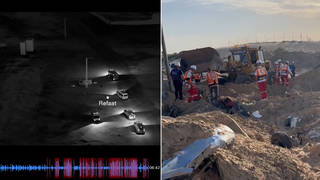
Israeli Prime Minister Benjamin Netanyahu has repeatedly rejected ceasefire deals and other chances to deescalate the devastating war in Gaza and beyond, all to remain in power and avoid corruption charges, according to a new investigation in The New York Times Magazine. “Netanyahu put the integrity of the coalition, the safety of his continuous rule of the government and the state … as a first priority ahead of any other priority,” says Ronen Bergman, Pulitzer Prize-winning Israeli investigative reporter.
Transcript
AMY GOODMAN: This is Democracy Now!, democracynow.org, The War and Peace Report. I’m Amy Goodman.
“How Netanyahu Prolonged the War in Gaza to Stay in Power.” That’s the headline of a new investigation in The New York Times Magazine published Friday. The co-authors write, quote, “Why, after nearly two years, has the war yet to reach a definitive conclusion? Why did Israel frequently turn away chances for de-escalation, instead expanding its military ambitions to Lebanon, to Syria and now to Iran? Why has the war dragged on, even as the leadership of Hamas was decapitated and more Israelis called for a cease-fire?” unquote.
The authors write they interviewed over 110 officials in Israel, the U.S. and the Arab world, in addition to reviewing scores of government documents and records to investigate these questions. They go on to say Netanyahu, quote, “when an extended cease-fire was finally forged in January, he broke the truce in March in part to keep his coalition intact. The cost of delay has been high: With each passing week, the delay has meant death to hundreds of Palestinians and horror to thousands more. It also meant at least eight more hostages died in captivity,” unquote.
We’re joined now by Ronen Bergman. He is a Pulitzer Prize-winning Israeli investigative reporter and staff writer for The New York Times Magazine, co-author of this piece in the magazine.
Can you lay out your findings, Ronen, “How Netanyahu Prolonged the War in Gaza to Stay in Power”?
RONEN BERGMAN: Thank you, Amy.
I think it’s, of course, very hard to differentiate between the different vectors in such a — such as the war in Gaza. It’s a regional war, something that started with Hamas attacking Israel on October 7th and Hezbollah attacking Israel on October 8, and then it erupted to a regional war. And some of the things that Netanyahu has done, I think any Israeli prime minister would do — countering, of course, following Hamas’ horrific attack. But some of what he did was clearly motivated at least partly by his coalition motivation and his fear of the integrity of the coalition. His coalition is dependent on the ultra-right parties that again and again threaten Netanyahu that if he goes for a deal, if he goes for a ceasefire, a ceasefire that will bring back the hostages, a ceasefire that could bring a new page to this so painful, bloody war, if he does that, then they will disassemble the government.
One of the scenes that we are describing, this is just a case study, together with my colleagues, the Jerusalem bureau chief of The New York Times, Patrick Kingsley, and the reporter for The New York Times in Jerusalem, Natan Odenheimer, is happening in April '24. You just quoted something that happened almost a year after, which repeated that. But in April ’24, Benjamin Netanyahu, together with his small Cabinet and national security and military advisers, agreed to a deal that would put the war to a halt. It would have weeks of ceasefire. It will have an exchange of Palestinian prisoners for Israeli hostages. And it will bring hope for negotiation for secession of hostilities, withdrawal of the Israeli military, and possibly also something that Netanyahu has tried for many, many years to get and was the closest of any prime minister, which is the normalization of relations with the most important Arab country, Saudi Arabia, that was willing to do that. He was about to bring this to the larger Cabinet. He says to advisers, “I'm not putting this on the agenda. I want to put this as a surprise, so not to let the more extremist ministers to oppose and coordinate.” And when he was just about to do that, the minister of treasury, Bezalel Smotrich, one of the ultra-right members of the Cabinet, entered the room bursting and said, “Prime Minister, I heard that you are going to put a proposal for a ceasefire.” The details bothered him, and he says, “I just wanted you to know, Prime Minister, I wanted you to know that if you do that, you do not have a government,” meaning that they will leave the coalition and it will be disassembled. And Netanyahu said, “No, no, no, no, no, I was not going to put anything on the table.” And he whispered to his aides, “Don’t put this offer forward.”
This happened in a time when it was not just sabotaging the possible hostage deal and a possible ceasefire deal, of course, ending the misery of the hostages, of the millions of Palestinians, bringing back the hostages, saving the life of many Israeli soldiers, and maybe, maybe be a page turn to a better future for the region, but it could also bring a normalization for Netanyahu, something that he really wanted. Now, Amy, it’s not that Netanyahu doesn’t want the hostages to come back. It’s not that Netanyahu doesn’t want normalization with Saudi Arabia. He does, I am sure. But there are things he wants more, or, maybe more precisely, things that he fears more. And that is the integrity of the coalition. And repeatedly, again and again, Prime Minister Netanyahu put the integrity of the coalition, the safety of his continuous rule of the government and the state, while he’s up on corrupted — severe corruption charges, he put this as a first priority ahead of any other priority.
AMY GOODMAN: So, just today, he was back in court, after coming to the United States, back in an Israeli court, saying, you know, he should not be tried because he has to deal with national security issues. You write, “For Netanyahu, the immediate rewards [of not having a peace deal] have been rich. He has amassed more control over the Israeli state than at any other point in his 18-year tenure as prime minister. He has successfully prevented a state inquiry that would investigate his own culpability, saying that the fallout must wait until the Gaza war ends, even as the defense minister, army chief, domestic spymaster and several top generals all either have been fired or have resigned.” And you talk about how he “attends court up to three times a week for his corruption trial, his government … now moving to fire the attorney general who oversees [the] prosecution.” If you can go more into that and an investigation into how October 2023 happened, with Netanyahu himself approving millions of dollars brought in, what, by Qatari officials to Gaza to support Hamas?
RONEN BERGMAN: Yeah, let me start with the latter, with your permission, Amy. Netanyahu said publicly and privately for years that he sees Hamas as an asset. How come? Because once you have Hamas, an extreme jihadist, fundamentalist regime in Gaza that does not recognize the right of Israel to exist — and now we see from Hamas secret protocols that were all about eradicating the state of the Jews. They were about — they wanted, not about, but they wanted to destroy Israel. They wanted to coordinate a regional war. Once you have something like that in Gaza, Netanyahu can say to the world, “Why do you want me to negotiate with the Palestinians? How can I negotiate with the Palestinian Authority in the West Bank when you have something, such an entity in Gaza?” And he saw Hamas as an asset.
He convinced the Qataris to funnel many, many hundreds of millions of dollars to help the Hamas government in Gaza, to help them survive, while at the same time, as we uncover, during the last year, since he became prime minister again in early '23, and until the war, he pushed back again and again and again on any idea of his military chiefs and the leaders of the intelligence community to confront Hamas, to assassinate their leaders. As late as October 1st, so a week before Hamas' attack, he pushed back on ideas to confront Yahya Sinwar, the mastermind behind October 7, and said, “You should keep them quiet. I have other priorities, like the normalization with Saudi Arabia.” So, the bottom line, his willingness to not just let Hamas thrive, but help Hamas thrive, not in order — not to force him to have international pressure to negotiate two-state solution, led to Hamas fortifying its rule and secretly planning the October 7 surprise.
Now, after the October 7th surprise, everybody was sure that Netanyahu is going to be oust — he’s going to be expelled from politics, after bringing a year of an attempt to weaken the judiciary, to fire the attorney general — what he’s trying to do now, as well — after a year of weakening the military, that was divided and disassembled in some of its units because of the judicial overhaul. Everybody thought, was sure, that he’s going — he’s going down in politics; that’s the end of his political career.
But Netanyahu prevailed. He used smart, sophisticated, sometimes brutal, sometimes unhonest politics, together with sophisticated propaganda machine working in Israel, together with confronting the judicial system. He promised to make himself available for his trial, but then, when the trial came, he’s doing or using any excuse not to be there. And at the peak of that — and I think this is the biggest triumph of his career — he was able to flip the war, hit Hezbollah — and we have to mention the fact that Hezbollah was the first to launch unprovoked attack on Israel — and then — and this is maybe the peak of his diplomatic and political career — convinced President Trump, just recently, on their call on October — oh, sorry, on June 9th, to agree that Israel will strike Iran, and then to convince President Trump to join the strike in sending the B-2 to bomb the Iranian nuclear sites.
AMY GOODMAN: Ronen, we just have 30 seconds.
RONEN BERGMAN: And now, after two years, he is almost — sorry?
AMY GOODMAN: We just have 30 seconds. Go ahead.
RONEN BERGMAN: I’m saying: And now, after two years, he is stronger than ever since October 7, and some say maybe even strong enough, after all that happened, to rewin the elections. And it’s not a coincidence that he’s trying to weaken the gatekeepers and fire all of them just before maybe announcing elections.
AMY GOODMAN: Ronen Bergman, I want to thank you for being with us, Israeli Pulitzer Prize-winning investigative reporter for The New York Times, co-authored the investigation in the magazine, “How Netanyahu Prolonged the War in Gaza to Stay in Power.” His book is titled Rise and Kill First: The Secret History of Israel’s Targeted Assassinations.
Coming up, we speak to the mayor of Oxnard and a migrant rights activist about the immigration raids this weekend, where a farmworker has died of his injuries and hundreds have been rounded up. Back in 20 seconds.
[break]
AMY GOODMAN: La Santa Cecilia playing their rendition of “Strawberry Fields Forever,” a tribute to migrant workers, in our Democracy Now! studio.












Media Options